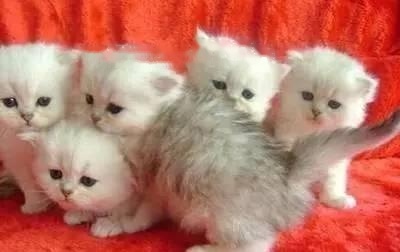Common diseases of newborn kittens are: hypoglycemia, dehydration, hypothermia. These diseases can kill kittens. Common signs of kitten sickness are: keep barking, grow small, become more and more lethargic, and become softer and softer. Kittens rarely meow, if they meow often, it means they are not feeling well: too cold, hungry, sick, etc.

1. Dehydration
Without enough water intake, Diarrhea, too hot or too dry an environment can dehydrate the kitten, if this happens, it needs to be detected and treated early. Kittens can easily die from dehydration.
There are two ways to diagnose whether the kitten is dehydrated:
1. Pull up the skin at the back of the kitten's neck, pinch it, and release it. No problem, if the skin is slowly returning to its original position, or maintaining the shape you pinched, it is dehydrated.
2. Touch the inside of the cat's mouth. If it is wet, there is no problem, but if the inside of the mouth feels sticky or dry, it is dehydration.
2. Hypothermia
Hypothermia kills many kittens. Kittens need to rely on external heat sources to maintain their normal body temperature. The normal body temperature measured from the anus is:
The first week: 35°~37.2℃
The second/third week: 36.1°~37.7℃
By the fourth week, it is the normal body temperature of an adult cat: 37.7°~38.9°C If the body temperature drops below 34.4°C, the metabolism is reduced to a very dangerous level, and immediate measures should be taken to warm the kitten . Healthy kittens can generally be rescued if they are slowly warmed up. Warming too quickly can kill the kitten. The best way is to use human body temperature to warm up against your own body.
The ambient temperature should be kept at 29.4°~32.2°C for the first four days of the newborn kitten, and then it can be gradually lowered to the 7th to 10th day (26.7°C, by the end of the fourth week) , to 22.2°C. If there are several kittens in a litter, the temperature does not need to be so high, because they will snuggle together to keep warm.
3. Low blood sugar
Appears as weakness, convulsions, coma. If so, feed the kitten glucose. A little syrup (or honey) on the tongue may bring it back to life.
Four , constipation
Cats fed with cat formula are more prone to constipation, so sometimes they need to be fed some plain water, or a little ointment to remove hairballs is fed to the kitten in warm water , which softens the stool. If you don't have a bowel movement for a long time, the wall of the large intestine will be excessively expanded, and even if you finally have a bowel movement, the large intestine will not work properly.
5. Diarrhea
Kittens can die from diarrhea. See a doctor promptly when their stools are bad-smelling, watery, bloody, or accompanied by vomiting. Kittens can become dehydrated quickly. Rehydrate by subcutaneous injection and feed electrolyte-rich water. Diarrhea may also require anti-inflammatory medication.
![[Dog Training 5] The training method of pet dog dining etiquette](/static/img/12192/12192_1.jpg)




